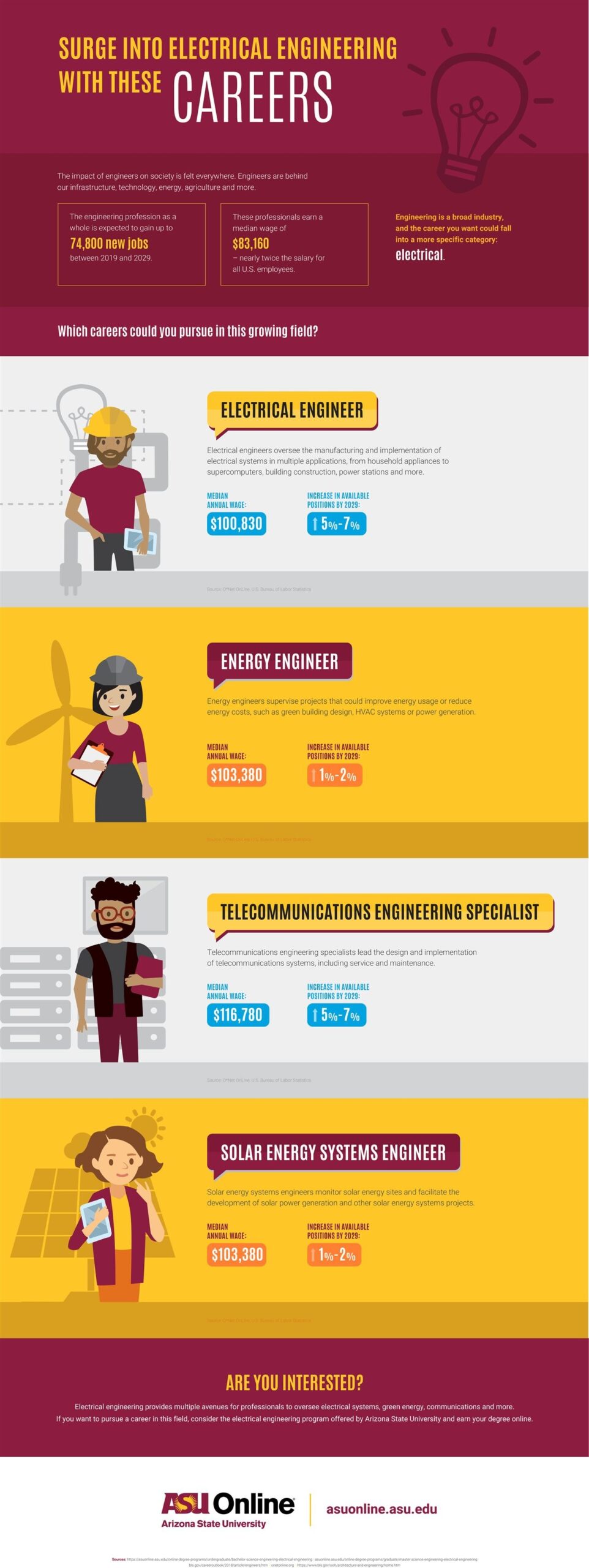(BPT) - As the world becomes increasingly digital, careers in electrical engineering continue to be in high demand. Technology constantly changes and advances, which means trained electrical engineers who are skilled and agile will be needed to adapt to the needs of that ever-changing technology.
What do electrical engineers do?
Simply put, electrical engineers design, develop and test electrical equipment and systems. Their work ranges from managing the largest power grids to designing the smallest electrical components in cell phones.
"Electrical engineering is very broad, with many opportunities in integrated circuit design and manufacture, signal processing and machine learning, controls and robotics, telecommunication and antenna design, and electrical power generation and delivery," said Dr. David Allee, professor at the Ira A. Fulton Schools of Engineering at Arizona State University.
A few examples of the tasks involved in electrical engineering include creating algorithms to better process digital signals, improving complex electrical devices, designing circuits systems and developing transistors.
Today, electrical engineers are needed in a wide variety of fields, including:
- Auto industry
- Energy systems
- Health care
- Mobile networking
- Renewable energy
- Robotics development
- Space exploration
- Sustainability
- Telecommunications
Is electrical engineering a lucrative career?
According to the U.S. Bureau of Labor Statistics, demand for engineers is projected to continue growing over the next several years - about 3% from 2019-2029.
Job growth for electrical and electronics engineers is projected to occur largely in professional, scientific and technical services firms, as more companies are expected to tap the expertise of engineers for projects involving electronic devices and systems.
"Typically, electrical engineering graduates have no trouble getting a lucrative job," Allee said. "Many get multiple good offers."
The rapid pace of technological innovation will also create demand for electrical and electronics engineers to develop sophisticated consumer electronics such as virtual reality tools.
The bureau also notes that in research and development, engineering expertise will be needed to design electrical distribution systems related to new technologies, and electrical engineers will be essential in new developments including semiconductors and communications technologies.
"Electrical engineering is a rewarding and challenging career where your skills help build a better world,' he said. 'Electrical engineering salaries are competitive as well.'
The salary range for electrical engineers is approximately $63,000-$155,000 per year. Here is the breakdown for salaries for electrical engineers in top industries:
- Research and development in the physical, engineering and life sciences - $116,050
- Semiconductor and other electronic component manufacturing - $107,680
- Navigational, measuring, electromedical and control instruments manufacturing - $104,480
- Electric power generation, transmission and distribution - $102,510
- Engineering services - $98,440
How to become an electrical engineer
Most electrical engineer jobs require a bachelor's degree, and some positions require engineers to be licensed. There are degree programs that, in the process of graduating with a degree, will also lead to licensure.
"Upon entry into an electrical engineering program, the most important skills to have are an aptitude for mathematics and a willingness to work hard," Allee said.
The role of electrical engineer requires general knowledge of:
- The practical application of engineering science and technology.
- Circuit boards, processors, chips, electronic equipment and computer hardware and software, including applications and programming.
- Design techniques, tools and principles involved in production of precision technical plans, blueprints, drawings and models.
- Arithmetic, algebra, geometry, calculus, statistics and their applications.
- The structure and content of the English language, including spelling, composition and grammar.
'Learn as much mathematics and physics as you can. Also, learn to work well with others. Engineering is a collaborative effort,' he said.
Where can you find an accredited engineering degree program?
According to CollegeFactual.com, there are 390 schools offering electrical engineering degrees in the U.S. Students seeking a quality electrical engineering program should look for those that both focus on the required knowledge listed above and are accredited by the Accreditation Board for Engineering and Technology, Inc. (ABET).
Arizona State University is the first to offer fully online electrical engineering degree programs accredited by the Engineering Accreditation Commission of ABET through ASU Online. ASU Online degrees meet the commission's educational standards and prepare students to excel in engineering fields.
A master's degree in electrical engineering will help graduates pursue careers requiring advanced knowledge and skills, including specialized and supervisory positions. Some advanced engineering jobs or manager roles today may even require a master's degree. Earning an advanced degree can also increase your salary and earning potential in the field.
To learn more about degrees in electrical engineering, check out ASUOnline.asu.edu.


